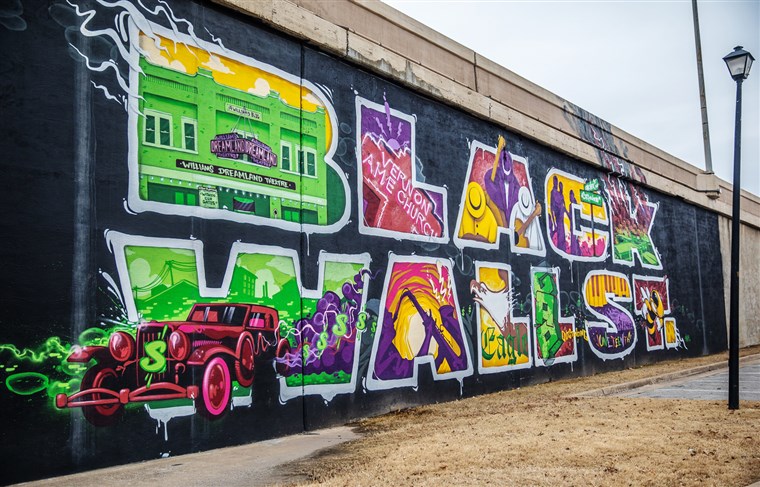 The famed Greenwood District, known as Black Wall Street, in Tulsa, Oklahoma, was one of the most prosperous African-American communities in the United States.
The famed Greenwood District, known as Black Wall Street, in Tulsa, Oklahoma, was one of the most prosperous African-American communities in the United States.
They’ve heard it all before. Set a budget. Avoid high-interest debt. And, oh yes, it sure is smart to get that 401(k) match from your employer.But for a new generation of Black financial enthusiasts, that’s just not going to cut it.In the real world and increasingly online, they are pushing their followers to take bolder steps to create wealth. This includes investing in stocks and even cryptocurrencies. Part of their argument is that Black Americans need to make big moves to make up for stolen time.For over a century after emancipation, institutional policies ranging from Jim Crow segregation to modern-day redlining have disenfranchised Black people from building generational wealth. Today, Black Americans hold just 3.8% of $116 trillion in wealth in the U.S., according to data from the Federal Reserve.
“There is a deep well, a deep sense of longing for opportunities and looking for ways to be successful built into African American history and experience,” says Shennette Garrett-Scott, an associate professor of history and African American studies at the University of Mississippi.
The advocates’ message is not falling on deaf ears. Data show that while fewer Black Americans invest in stocks than White people, they are actually more receptive to holding cryptocurrencies. A recent Harris Poll survey found that in the U.S., 30% of Black and 27% Hispanic investors own cryptocurrency, compared with just 17% of White investors.
The same survey found that over half of Black and Hispanic Americans who had heard of cryptocurrencies believe their decentralized nature is a positive aspect, compared with 44% of all Americans.
Garrett-Scott says a majority of Black Americans do not have access to people within their networks with entrepreneurial knowledge. Instead, many turn to the internet and social media.
Evidence of this is prominent in the Clubhouse app. In the audio-only social-media network — it’s like a cross between a podcast and a call-in radio network — many “clubs” with names such as Black Women Who Invest, Black Wealth Matters and Black Bitcoin Billionaires have sprung up. And in just a few months, they have attracted tens of thousands of followers.
Tani Chambers, 44, runs Black Women Who Invest. Founded in December, it now has over 21,000 followers. The group meets every Saturday for a session called “Investing 101” and every Sunday for a book club. The focus: long-term investment in areas such as retirement accounts, real estate and index funds.
Chambers is motivated in part by her belief that Black Americans need to invest more. In her 20s, for instance, she remembers her mother only telling her she needed to save some of the paychecks from her Madison Avenue job. It wasn’t until five years ago that the daughter of a Jamaican immigrant and a Black American decided she need to do more than save.
“That’s not enough, especially for Black women,” said Chambers, who would go on to found a fintech startup and social-media presence pushing Black women to embrace investing.
Ross Mac, 31, a former Wall Street sales analyst from Chicago founded Black Wealth Matters, also on Clubhouse. The group now has more than 68,000 followers, many of who tune in every Wednesday to chat about a catch-all of personal finance topics, ranging from budgeting to investing.
“This is the new civil rights movement,” he says. Mac, who started making financial literacy videos on Instagram and YouTube in 2019, also hosts a weekly segment called “Maconomics” on cable music network Revolt TV.
Clubhouse is still an invite-only app frequented by billionaires and backed by Silicon Valley insiders. The company says it was founded to “build a social experience that felt more human.” Key to that goal is allowing listeners to chime in and ask questions, often speaking to experts they might not otherwise have had the chance to connect with. The democratized nature of Clubhouse explains some of the appeal to Black listeners.
When Chambers joined Clubhouse in October, the demographics in many of her rooms-of-choice reflected the White, male-dominated venture capital industry.
“I found out it wasn’t the safest space for Black women to speak or be heard on financial topics,” she said.
Chambers’ club is an offshoot of a syndicate she started for Black women investors. “We have to take some high risks and make the investments that maybe are a little bit more risky than conservative because we are playing catch-up,” she says.
However — while Clubhouse users can report accounts if they exhibit suspicious behavior and those accounts can potentially be suspended — risks abound for those who aren’t careful about who and what they are listening to.
As people increasingly turn to social media platforms as a source of tips for managing their money, and an ever-expanding pool of users offer such content, it’s becoming harder to separate reasonable lessons from ideas that are misinformed and potentially catastrophic for personal finances.
Investing in assets such as equities and Bitcoin can be risky, and several studies have shown that stock picking fails to beat the broader market over the long run, even when done by finance-industry professionals. Earlier this year, New York’s top law enforcement officer warned consumers about the susceptibility of the cryptocurrency market to “speculative bubbles” and abuse by criminals.
Mac says he hears misinformation on Clubhouse every day. Black Wealth Matters issues a disclaimer on its homepage and the hosts often repeat it audibly, notifying listeners that their advice is for informational use only.
One of Chambers’ club’s mottos is “no hype, just facts,” she said. Black Women Who Invest also issues a disclaimer on its homepage.
Outside of clubs like Chamber’s and Mac’s, Clubhouse also hosts conversations by an expanding number of Black cryptocurrency evangelists with tens of thousands of followers.
Black Bitcoin Billionaires is the largest cryptocurrency group on the app with about 51,800 followers. The group has a partnership with Square Inc., where the company sponsors Bitcoin giveaways for members through its Cash App.
Lamar Wilson, co-founder of Black Bitcoin Billionaires, said when he first read a public technical guide to Bitcoin, the currency to him symbolized freedom from an oppressive financial system.
“All it did was represent the opposite of what goes on in this county,” Wilson, 41, said. “They say we’re a capitalist society, yet they always bail out the biggest ones of us and don’t allow the little guy to compete.”
Niles Stewart, 23, started investing in Bitcoin — despite disapproval from his father — while studying at DePauw University. The founder of Black Crypto Talks says he now has more assets in cryptocurrency than in cash.
“African Americans have had to rely on self-help and self-determination because the institutions are not serving them,” Garrett-Scott of the University of Mississippi said. “At the same time, it’s like a double-edged sword. It cuts both ways. There’s opportunity and risk in the same moment.”
In an ideal world, Garrett-Scott said Black Americans would be able to take advantage of existing opportunities to build wealth instead of working around barriers.
“It is my hope that people will continue to keep this spark of Black entrepreneurship and Black capitalism alive in these new digital spaces because these are spaces that weren’t created for us,” Garrett-Scott said.




